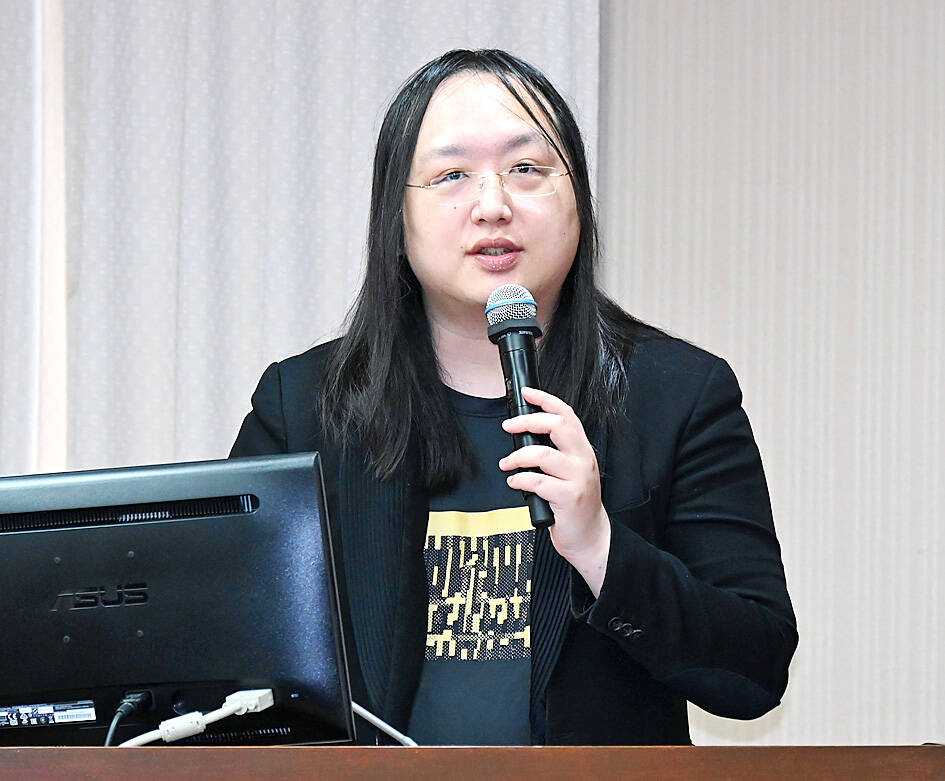The legislature’s Education and Culture Committee yesterday passed a motion requiring the Ministry of Digital Affairs (MODA) to finalize by August a model that would serve as a basis for drafting a news media bargaining law to govern pricing content.
The ministry should make a decision after analyzing similar legislation in other countries, together with bills proposed by legislators on the committee, the motion says.
The committee called a meeting with concerned government agencies after Taiwanese news media associations conducted two rounds of negotiations with representatives of Google and Meta in December last year and in March.

Photo: Chu Pei-hsiung, Taipei Times
Following negotiations in December, Google on March 8 launched a Taiwan News Digital Co-Prosperity Fund, in which it pledged to spend NT$300 million (US$9.78 million) in the next three years to facilitate the digital transformation of Taiwan’s news industry.
Meta rejected any co-prosperity plan.
Democratic Progressive Party Legislator Chang Liao Wan-chien (張廖萬堅) said the dialogue between digital platforms and Taiwanese news media failed to touch on the matter of legislation, which is the core issue.
Google’s co-prosperity fund would only spend NT$100 million per year, which looks more like a public relations fund to appease local news media, Chang Liao said.
“The fund would be managed by the Digital Transformation Association, but we are not certain if it is a credible organization and would safeguard freedom of speech,” he said, adding that the fund should be managed by the government.
Deputy Minister of Digital Affairs Lee Huai-jen (李懷仁) told the committee that all government agencies have agreed that news has value, is related to public interests and should not be treated as a mere commodity.
The co-prosperity fund would not be enough to support local news media, as issues such as a reasonable division of profit between news media and digital platforms must be addressed, he said.
A third round of dialogue is to be held soon after the Digital Transformation Association begins accepting applications for funding from news media outlets, he said.
“We hope the dialogue would also be a way to supervise how the co-prosperity fund is used,” he said.
Meanwhile, the Executive Yuan has tasked the MODA and the Fair Trade Commission to study similar laws in other countries and consider what the best model for Taiwan would be, he said.
The News Media Bargaining Code in Australia makes it mandatory for digital platforms to negotiate over the pricing of content with news media should the two fail to reach an agreement, but such a practice would put small and medium-sized news media in an unfavorable position, he said.
Taiwan’s Copyright Act would have to be completely amended should the nation adopt neighboring rights in the EU copyright law demanding payments from digital platforms for using content produced by news media, he said.
The Ministry of Finance rejected levying a digital tax, Lee added.

The High Prosecutors’ Office yesterday withdrew an appeal against the acquittal of a former bank manager 22 years after his death, marking Taiwan’s first instance of prosecutors rendering posthumous justice to a wrongfully convicted defendant. Chu Ching-en (諸慶恩) — formerly a manager at the Taipei branch of BNP Paribas — was in 1999 accused by Weng Mao-chung (翁茂鍾), then-president of Chia Her Industrial Co, of forging a request for a fixed deposit of US$10 million by I-Hwa Industrial Co, a subsidiary of Chia Her, which was used as collateral. Chu was ruled not guilty in the first trial, but was found guilty

DEADLOCK: As the commission is unable to forum a quorum to review license renewal applications, the channel operators are not at fault and can air past their license date The National Communications Commission (NCC) yesterday said that the Public Television Service (PTS) and 36 other television and radio broadcasters could continue airing, despite the commission’s inability to meet a quorum to review their license renewal applications. The licenses of PTS and the other channels are set to expire between this month and June. The National Communications Commission Organization Act (國家通訊傳播委員會組織法) stipulates that the commission must meet the mandated quorum of four to hold a valid meeting. The seven-member commission currently has only three commissioners. “We have informed the channel operators of the progress we have made in reviewing their license renewal applications, and

Taiwan People’s Party (TPP) Chairman Huang Kuo-chang (黃國昌) yesterday appealed to the authorities to release former Taipei mayor Ko Wen-je (柯文哲) from pretrial detention amid conflicting reports about his health. The TPP at a news conference on Thursday said that Ko should be released to a hospital for treatment, adding that he has blood in his urine and had spells of pain and nausea followed by vomiting over the past three months. Hsieh Yen-yau (謝炎堯), a retired professor of internal medicine and Ko’s former teacher, said that Ko’s symptoms aligned with gallstones, kidney inflammation and potentially dangerous heart conditions. Ko, charged with

Taiwan-based publisher Li Yanhe (李延賀) has been sentenced to three years in prison, fined 50,000 yuan (US$6,890) in personal assets and deprived political rights for one year for “inciting secession” in China, China's Taiwan Affairs Office spokesman Chen Binhua (陳斌華) said today. The Shanghai First Intermediate People’s Court announced the verdict on Feb. 17, Chen said. The trial was conducted lawfully, and in an open and fair manner, he said, adding that the verdict has since come into legal effect. The defendant reportedly admitted guilt and would appeal within the statutory appeal period, he said, adding that the defendant and his family have